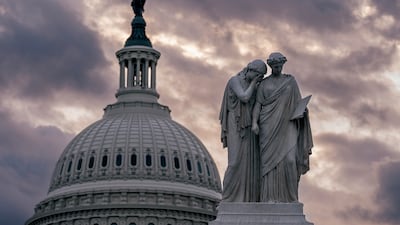The US Capitol has known many testing times. Its construction in 1793 got off to a slow and under-funded start, and in 1814 it was almost completely burned to the ground by British troops.
As the leading symbol of American democracy, it is unsurprising that it has been the target of anti-democratic forces, both from at home and abroad. But after more than two centuries of it standing, recent years have been some of the toughest times in decades.
On this day in 2021, the reputation of America’s politics was dealt a significant blow. The Capitol riots broke out, involving more than 2,000 supporters of former US president Donald Trump, who stormed and vandalised the building. One of them was shot and killed by a police officer. While no law enforcement officials died at the scene, five deaths have been attributed to the events of the day, one due to natural causes that a medical examiner said were exacerbated by the riots, and four suicides that were also linked.
People around the world watched the scenes of chaos with surprise and questions about America’s polarised state. Many Americans were understandably horrified by the actions of the rioters. They were keen to get back to normal operations in the building, something that would demonstrate the resilience of the country. But after such a divisive period, that has not been easy either.
This week’s chaos in the US House of Representatives is a good example. On Wednesday, Republicans in the chamber failed in three successive votes to elect a new speaker. This meant that there have now been six defeats in two days. It is the result of far-right legislators’ opposition to California Republican Kevin McCarthy, who is majority leader, getting the job.
The failure to choose Mr McCarthy is despite support for him from both former president Trump and his then vice president Mike Pence. On Wednesday morning, Mr Trump posted: “Some really good conversations took place last night, and it's now time for all of our great Republican House members to vote for Kevin, close the deal, take the victory and watch crazy Nancy Pelosi fly back home.” If such a ringing endorsement was not enough to help Mr McCarthy’s campaign, it is hard to see how the logjam will be solved.
At the same time, US President Joe Biden called the Republican’s failure “embarrassing,” and that he hoped they would “get their act together”. Many Americans will be feeling the same, even the apolitical. While the country’s economy is not in as bad a state as some of its international partners, tense and challenging times abroad mean that the need for the US to exercise its huge influence responsibly is vital.
In December, the Capitol hosted Ukrainian President Volodymyr Zelenskyy, who delivered a historic address, in part thanking the US for its support as his country battles Russia, as well asking for more commitment. But failing bipartisanship in the US is hurting foreign policy and causing confusion about America’s ability to deliver globally. Important ambassadorial posts from India to the UAE remain vacant due to Congressional delays.
Also worrying is what this division means in the run-up to the next US presidential election, which will happen in 2024. The Capitol riots fell at the end of the election season of 2020 and as a protest against its results. If politicians on both sides fail to show that they can come together for the sake of the country and its reputation abroad, it is fanciful to assume that voters on both sides will. That means that a repeat of the anger as was seen in 2021 becomes more possible.
The Capitol is not about to burn to the ground as it did in 1814, and even an exact repeat of the riots are unlikely, after an extensive security overhaul. But with so much political turmoil taking place in the House of Representatives, the legacy of recent violence looms large. That division is a damaging distraction at a time when the US needs clarity and unity.
















